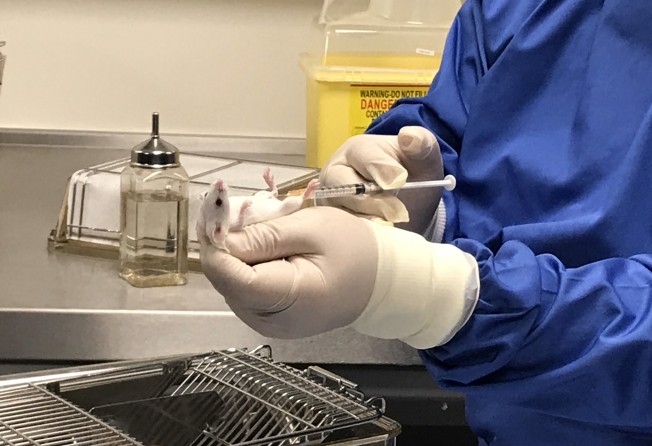Chemical compound discovered by HKU-led team could open the way for a new antiviral drug with broad application
- The compound, AM580, was found to inhibit the development of seven to eight types of virus, including Sars, Mers and H7N9
- Further rounds of tests are necessary, but the researchers are hopeful the drug might be on the market in five years’ time

Researchers in Hong Kong have discovered a chemical compound that helps stave off multiple viruses, including the deadly Sars virus, raising hopes of a drug that can work against an array of infectious diseases.
Rather than attacking the viruses, the compound stops them multiplying by making changes to the host’s cells.
In the study, by a team led by University of Hong Kong scientists, a chemical compound called AM580 was found to be able to inhibit the activities of seven to eight types of virus, including the deadly severe acute respiratory syndrome (Sars) coronavirus, Middle East respiratory syndrome (Mers) coronavirus and the bird flu H7N9 virus, but not HIV.
Following the discovery, the researchers said they hoped a drug could be available in five years which could tackle novel viruses that cause emerging infectious diseases.
While ribavirin is the only currently approved broad-spectrum antiviral drug, and has been used in the past to treat Sars, Professor Yuen Kwok-yung, a top infectious diseases expert who led the research team, said it was “incomparable” with the latest discovery.
“[AM580] is more broad-spectrum than the previous drugs that we know about, like ribavirin. And it is more potent than ribavirin in many aspects,” Yuen said. “This is a drug with great potential.”
The compound was found to work best against the Mers virus, but was ineffective against HIV.
The study’s findings have been published in the scientific journal Nature Communications.
Yuan Shuofeng, a postdoctoral fellow at the university and the study’s first author, explained that AM580 could prevent the binding of a cell protein named SREBP and a DNA sequence called SRE.
The binding can lead to production of fatty acid, an element essential for the replication of almost all types of virus.
Without the binding process, viruses lack the requisite element to replicate.
“This drug does not target viruses, but targets the metabolism of lipids in our cells,” Yuen said.
In experiments for the study, mice infected with the Mers virus which were given AM580 had a 100 per cent survival rate and experienced less weight loss compared with those without the drug compound. The extent of viral infection in the lungs and brain of those without the compound was 10,000 times that of those with it.

A higher survival rate and lower viral level were also seen in mice infected with the H7N9 virus and given AM580, despite the treatment outcome being comparatively less effective than those given zanamivir, an existing medication used to treat influenza A and B viruses.
Yuen revealed that some investors had shown interest in the discovery. As further studies would be needed to test the drug on bigger animals such as monkeys, and clinical trials on humans would be required, Yuen hoped the drug would be made available in five years’ time.
The team believed AM580 could be developed as a safe antiviral drug in the future, as its chemical structure was very similar to an existing medication named tamibarotene, which is currently used in Japan to treat acute promyelocytic leukaemia, a form of blood cancer.
The team said tamibarotene is not toxic to cells and has few side effects.
Yuan said they were studying whether AM580 and tamibarotene might be used as preventive medications. A patent application has also been filed to use both drugs for broad-spectrum treatment and prevention.